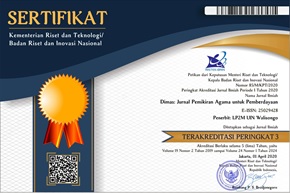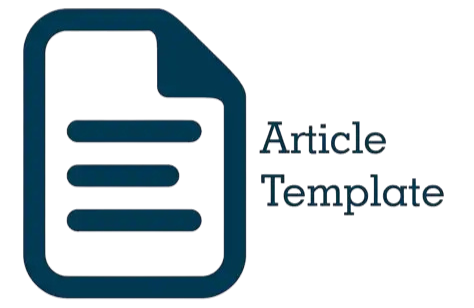Strategi Survival Masyarakat Pesisir dan Pedalaman Sumenep di Tengah Krisis Ekologi dan Industrialisasi
DOI:
https://doi.org/10.21580/dms.2020.202.5495Keywords:
industrialisasi, kemiskinan, krisis ekologi, strategi survival, sustainable.Abstract
This study discusses poverty, which until now is still a major problem for the Indonesian state. The effort to eradicate poverty becomes a big commitment through the projected Sustainable Development Goal's (SDG's) which are determined to reduce the number of poor people to 50% in the next 2030. Instead of alleviating poverty, SDG's which insinuate welfare are more and more pressed by poverty itself. Global warming which drives climate change is uncertain, causes an ecological crisis on one side, and creates a consumptive culture of society on the other side. This research uses a qualitative method, in which coastal communities and inland farmers become in Sumenep, Madura is the object of this study. due to climate change that is getting worse, fishermen and farmers, must rearrange their survival strategies to meet the needs of family income. The government, in this case, must be encouraged to be a catalyst for change, in order to realize the social welfare of the community through the development of community-based communities that are independent and sustainable.
Penelitian ini membahas tentang kemiskinan, yang sampai saat ini masih menjadi persoalan utama negara Indonesia. Upaya untuk mengentaskan kemiskinan menjadi komitmen besar melalui proyeksi Sustainable Development Goal’s (SDG’s) yang bertekad untuk menekan jumlah penduduk miskin hingga 50% pada 2030 mendatang. Alih-alih mengentaskan kemiskinan, SDG’s yang meng-insinuasikan kesejahteraan justru samakan terdesak oleh kemiskinan itu sendiri. Global warming yang mendorong perubahan iklim tidak menentu, menyebabkan krisis ekologi pada satu sisi, dan menciptakan budaya konsumtif masyarakat pada sisi yang lainnya. Penelitian ini menggunakan metode kualitatif, di mana masyarakat pesisir dan petani pedalaman menjadi di Sumenep, Madura menjadi objek kajian ini. akibat perubahan iklim yang semakin buruk, nelayan dan petani, harus mengatur kembali strategi survival mereka untuk memenuhi kebutuhan nafkah keluarga. Pemerintah dalam hal ini, mesti didorong untuk menjadi katalisator perubahan, demi mewujudkan kesejahteraan sosial masyarakat melalui pengembangan masyarakat berbasis komunitas yang bersifat mandiri dan berkelanjutan.
Downloads
References
Anwar, Sakaria Anwar. 2016. “Strategi Nafkah (livelihood) Masyarakat Pesisir Berbasis Modal Sosial.” SOCIUS : Jurnal Sosiologi 13 (1): 1–21.
Asnawi, Robet. 2015. “PERUBAHAN IKLIM DAN KEDAULATAN PANGAN DI INDONESIA. TINJAUAN PRODUKSI DAN KEMISKINAN” 1 (03): 17.
Darmawan, Ir. 2001. “Penyusunan Program Pengelolaan Wilayah Pesisir Dan Pulau-Pulau Kecil Secara Terpadu,” 167.
Dharmawan, Arya Hadi. 2007. “Dinamika Sosio-Ekologi Pedesaan: Perspektif Dan Pertautan Keilmuan Ekologi Manusia, Sosiologi Lingkungan Dan Ekologi Politik.” Sodality: Jurnal Sosiologi Pedesaan 1 (1). https://doi.org/10.22500/sodality.v1i1.5939.
Giddens, Anthony. 2002. Jalan Ketiga. Pnj, Ketut Arya Mahardika. Jakarta: Gramedia Pustaka Utama.
Hartati, Anna Yulia. 2012. “Global Environmental Regime: Di Tengah Perdebatan Paham Antroposentris Versus Ekosentris.” SPEKTRUM 12 (2). https://publikasiilmiah.unwahas.ac.id/index.php/SPEKTRUM/article/view/471.
Hidayati, Ida Nurul, and Suryanto Suryanto. 2015. “Pengaruh Perubahan Iklim Terhadap Produksi Pertanian Dan Strategi Adaptasi Pada Lahan Rawan Kekeringan.” Jurnal Ekonomi & Studi Pembangunan 16 (1): 42–52. https://doi.org/10.18196/jesp.2015.0040.42-52.
Ishatono, Ishatono, and Santoso Tri Raharjo. 2016. “Sustainable Development Goals (Sdgs) Dan Pengentasan Kemiskinan | Ishatono | Share: Social Work Journal.” 2016. http://journal.unpad.ac.id/share/article/view/13198.
Lako, Andreas. 2015. “Menghijaukan Ekonomi, Bisnis & Akuntansi,” 9.
Lawang, Robert Z. 2005. Kapital Sosial ; Perspektif Sosiologik Suatu Pengantar. Pertama. Jakarta: FISIP UI Press.
Rahayuningsih, Eni Sri. 2018. “Analisis Profil Tenaga Kerja Indonesia (Tki) Asal Madura | Rahayuningsih | Jurnal Pamator: Jurnal Ilmiah Universitas Trunojoyo.” 2018. https://eco-entrepreneur.trunojoyo.ac.id/pamator/article/view/4437.
Romadhon, Agus. 2014. “Analisis Kerentanan Dan Adaptasi Masyarakat Pulau Gili Labak Terhadap Perubahan Iklim Berbasis Ekosistem Terumbu Karang.” Trunojoyo XXII (lingkungan hidup). http://ilmukelautan.trunojoyo.ac.id/wp-content/uploads/2015/03/13.ANALISIS-KERENTANAN-DAN-ADAPTASI-MASYARAKAT-PULAU-GILI-LABAK-TERHADAP-PERUBAHAN-IKLIM-BERBASIS-EKOSISTEM-TERUMBU-KARANG.Agus-Romadhon.Disampaikan-Konferensi-dan-Seminar-Nasional-Pusat-Studi-Lingkungan-Hidup-XXII-2014.pdf.
Rusastra, I Wayan. 2011. “REORIENTASI PARADIGMA DAN STRATEGI PENGENTASAN KEMISKINAN DALAM MENGATASI DAMPAK KRISIS EKONOMI GLOBAL1)” 4 (2): 16.
Satria, Arif. 2009. Ekologi Politik Nelayan. Lkis Pelangi Aksara.
———. 2015. Pengantar Sosiologi Masyarakat Pesisir. Jakarta: Pustaka Obor Indonesia.
Satriawan, Bondan, and Henny Oktavianti. 2012. “Upaya Pengentasan Kemiskinan Pada Petani Menggunakan Model Tindakan Kolektif Kelembagaan Pertanian.” Jurnal Ekonomi Pembangunan 13 (1). http://publikasiilmiah.ums.ac.id/handle/11617/1732.
Widodo, Slamet. 2008. “Migrasi International Tenaga Kerja Pertanian Di Kabupaten Bangkalan.” Jurnal Pamator : Jurnal Ilmiah Universitas Trunojoyo 1 (1). https://doi.org/10.21107/pamator.v1i1.3110.
———. 2011. “Strategi Nafkah Berkelanjutan Bagi Rumah Tangga Miskin Di Daerah Pesisir.” Hubs-Asia 10 (1). http://hubsasia.ui.ac.id/old/index.php/hubsasia/article/view/890.
Downloads
Published
Issue
Section
License
Copyright
The copyright of the received article shall be assigned to the journal as the publisher of the journal. The intended copyright includes the right to publish the article in various forms (including reprints). The journal maintains the publishing rights to the published articles. Therefore, the author must submit a statement of the Copyright Transfer Agreement.*)
Licensing

This work is licensed under a Creative Commons Attribution-ShareAlike 4.0 International License.
In line with the license, authors are allowed to share and adapt the material. In addition, the material must be given appropriate credit, provided with a link to the license, and indicated if changes were made. If authors remix, transform or build upon the material, authors must distribute their contributions under the same license as the original.
_______
*) Authors whose articles are accepted for publication will receive confirmation via email and send a Copyright Transfer Agreement.









